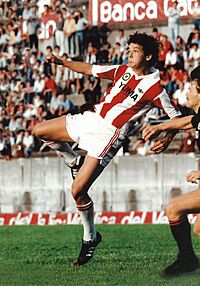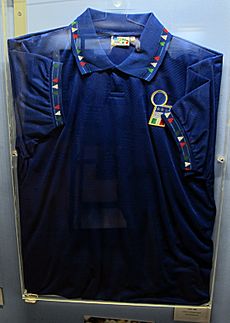Roberto Baggio facts for kids
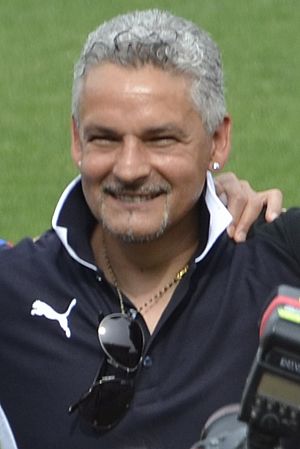
Baggio in 2013
|
|||||||||||||||||||
| Personal information | |||||||||||||||||||
|---|---|---|---|---|---|---|---|---|---|---|---|---|---|---|---|---|---|---|---|
| Full name | Roberto Baggio | ||||||||||||||||||
| Date of birth | 18 February 1967 | ||||||||||||||||||
| Place of birth | Caldogno, Italy | ||||||||||||||||||
| Height | 1.74 m (5 ft 9 in) | ||||||||||||||||||
| Position(s) | Forward, attacking midfielder | ||||||||||||||||||
| Youth career | |||||||||||||||||||
| 1974–1980 | Caldogno | ||||||||||||||||||
| 1980–1983 | Vicenza | ||||||||||||||||||
| Senior career* | |||||||||||||||||||
| Years | Team | Apps | (Gls) | ||||||||||||||||
| 1982–1985 | Vicenza | 36 | (13) | ||||||||||||||||
| 1985–1990 | Fiorentina | 94 | (39) | ||||||||||||||||
| 1990–1995 | Juventus | 141 | (78) | ||||||||||||||||
| 1995–1997 | AC Milan | 51 | (12) | ||||||||||||||||
| 1997–1998 | Bologna | 30 | (22) | ||||||||||||||||
| 1998–2000 | Inter Milan | 41 | (9) | ||||||||||||||||
| 2000–2004 | Brescia | 95 | (45) | ||||||||||||||||
| Total | 488 | (218) | |||||||||||||||||
| International career | |||||||||||||||||||
| 1984 | Italy U16 | 4 | (3) | ||||||||||||||||
| 1988–2004 | Italy | 56 | (27) | ||||||||||||||||
|
Medal record
|
|||||||||||||||||||
| *Club domestic league appearances and goals | |||||||||||||||||||
Roberto Baggio (born 18 February 1967) is a famous Italian former footballer. He mostly played as a second striker or an attacking midfielder. Many people consider him one of the greatest players of all time.
Baggio was known for his amazing dribbling skills, powerful free-kicks, and ability to score goals. In 1993, he won the FIFA World Player of the Year award and the Ballon d'Or, which are huge honors in football. He was also named in the FIFA 100 list by Pelé in 2004, which featured the world's greatest living players.
He played 56 matches for the Italian national team and is one of their top goalscorers. Baggio helped Italy finish third in the 1990 FIFA World Cup. At the 1994 FIFA World Cup, he led Italy all the way to the final. He scored nine goals in World Cup tournaments, which is a record for Italy, shared with Paolo Rossi and Christian Vieri.
Roberto Baggio is often called Il Divin Codino ("The Divine Ponytail"). This nickname comes from his famous hairstyle and his incredible talent. After retiring, he became the president of the technical sector for the Italian Football Federation. He is also a FAO Goodwill Ambassador for the United Nations, working to help people around the world. In 2011, he was the first footballer to be inducted into the Italian Football Hall of Fame.
Contents
- Early Life and First Steps in Football
- Club Career Highlights
- International Career with Italy
- Player Profile
- Records and Key Statistics
- After Retirement: New Roles
- Outside of Football
- Images for kids
- See also
Early Life and First Steps in Football
Roberto Baggio was born in Caldogno, Italy. He was one of eight children. His younger brother, Eddy Baggio, also became a professional footballer.
Starting Young with Caldogno
Baggio began playing football at age nine for his hometown team, Caldogno. By the time he was 11, he was already scoring lots of goals and making many assists.
Joining Vicenza's Youth Team
A scout named Antonio Mora noticed his talent. At 13, Baggio joined the Vicenza youth team. He scored 110 goals in 120 matches, showing his amazing skill.
Professional Debut with Vicenza
Baggio started his professional career with Vicenza's senior team in 1983, when he was just 15. He helped the club get promoted to Serie B in the 1984–85 season.
A Tough Injury Early On
Just before moving to Fiorentina, Baggio suffered a serious knee injury in 1985. Doctors worried he might not play again. However, Fiorentina still believed in him and helped pay for his surgery.
Club Career Highlights
Fiorentina: Becoming a Star
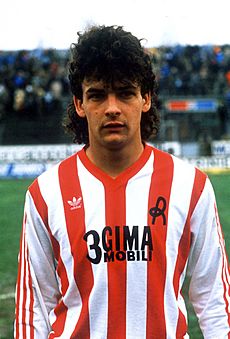
Fiorentina bought Baggio in 1985. Despite his early injury, he became very popular with the fans. He made his Serie A debut in September 1986.
First Serie A Goal and Key Performances
Baggio scored his first league goal in May 1987, helping Fiorentina avoid relegation. In the 1988–89 season, he scored 15 goals in Serie A, becoming one of the top scorers. His performances made him a hero to the fans.
Leading Fiorentina to a European Final
In the 1989–90 season, Baggio led Fiorentina to the 1990 UEFA Cup Final. They lost to Juventus, his future club. He was the second-highest goalscorer in Serie A that season with 17 goals.
Juventus: World Record Transfer and Major Wins
In 1990, Baggio moved to Juventus for a world record transfer fee. This move caused protests from Fiorentina fans. He took over the famous number 10 shirt.
Settling in at Juventus
In his first season, Baggio scored 14 goals and made 12 assists in Serie A. He was also the top scorer in the UEFA Cup Winners' Cup with nine goals.
Becoming Team Captain and European Champion
Baggio became Juventus's captain in the 1992–93 season. He had an amazing year, helping Juventus win the UEFA Cup, his only European club trophy. He scored two goals in the final. That year, he won the Ballon d'Or and FIFA World Player of the Year awards.
Winning the Serie A Title
In the 1994–95 season, Baggio helped Juventus win the Serie A title, his first scudetto. He also helped them win the Coppa Italia that year. He scored 115 goals in 200 games for Juventus.
AC Milan: Another League Title
In 1995, Baggio moved to AC Milan. He helped Milan win the Serie A title in his first season. This made him one of only six players to win the league in two years with different teams.
Challenges and Limited Playing Time
During his time at Milan, Baggio sometimes had disagreements with his coaches, who often gave him limited playing time. Despite this, he scored 19 goals in 67 appearances for the club.
Bologna: Finding His Form Again
In 1997, Baggio joined Bologna. He wanted to help the team avoid relegation and earn a spot in the 1998 FIFA World Cup.
A Great Season and World Cup Call-Up
Baggio had a fantastic season with Bologna, scoring a personal best of 22 goals in Serie A. His strong performances helped Bologna finish eighth and earned him a place in Italy's 1998 World Cup squad. He even cut off his famous ponytail at the start of the season, symbolizing a fresh start.
Inter Milan: Champions League Dreams
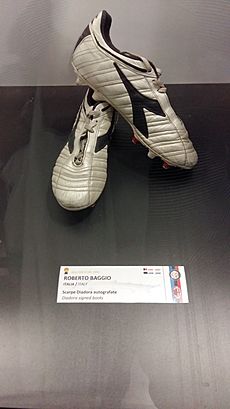
After the 1998 World Cup, Baggio signed with Inter Milan, his favorite childhood club. He wanted to play in the UEFA Champions League.
Ups and Downs at Inter
Baggio faced challenges at Inter, including injuries and changes in coaches. He often struggled to get regular playing time. However, he still scored important goals, including two memorable ones against Parma that helped Inter qualify for the Champions League.
Brescia: A Strong Finish to His Career
In 2000, Baggio moved to Brescia. He was made captain and wore the number 10 shirt. His goal was to help Brescia avoid relegation and possibly play in the 2002 FIFA World Cup.
Overcoming Injuries and Scoring Milestones
Despite more injury problems, Baggio continued to perform at a high level. In the 2000–01 season, he scored 10 goals and helped Brescia achieve their best Serie A finish since 1946. In 2002, he scored his 300th career goal. In 2004, he became the first player in over 30 years to score 200 goals in Serie A.
Retirement and Standing Ovation
Baggio played his last professional match on 16 May 2004, against AC Milan. He received a standing ovation from 80,000 fans at the San Siro stadium. Brescia retired his number 10 shirt in his honor. He finished his career with 205 goals in Serie A, making him the seventh-highest scorer of all time.
International Career with Italy
Baggio scored 27 goals in 56 matches for the Italian national team. This makes him one of Italy's top goalscorers.
1990 FIFA World Cup: Home Soil Heroics
Baggio played in his first World Cup in 1990, which was held in Italy. He scored two goals, including a famous "goal of the tournament" against Czechoslovakia. This goal involved him dribbling past several players before scoring.
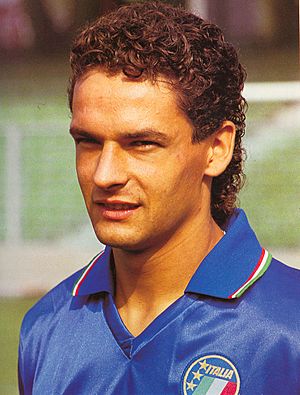
Italy finished third in the tournament, winning the bronze medal. Baggio showed his amazing talent throughout the competition.
1994 FIFA World Cup: Leading the Azzurri to the Final
Baggio was a key player for Italy in the 1994 FIFA World Cup in the United States. After a slow start in the group stage, he became unstoppable in the knockout rounds.
Incredible Knockout Stage Performances
He scored five crucial goals in the knockout stages.
- He scored two goals against Nigeria in the round of 16, including the winning penalty in extra time.
- He scored another match-winning goal against Spain in the quarter-finals.
- He scored two more goals against Bulgaria in the semi-finals, leading Italy to the final.
The Final and the Missed Penalty
Baggio was not fully fit for the final against Brazil due to a hamstring injury. The match ended 0–0 after extra time, leading to a penalty shootout. Baggio took Italy's last penalty, but he shot it over the crossbar. Brazil won the World Cup. This moment became one of the most famous and heartbreaking in World Cup history.
Despite the missed penalty, Baggio was awarded the Silver Ball as the second-best player of the tournament. Many people remember his incredible performances that led Italy to the final.
1998 FIFA World Cup: Scoring in Three World Cups
After some time away from the national team, Baggio was called up for the 1998 FIFA World Cup in France.
A Memorable Return
In Italy's first match against Chile, Baggio scored a penalty to equalize, making him the first Italian player to score in three World Cups. He scored his second goal of the tournament against Austria, helping Italy win their group.
Quarter-Final Exit
Italy was eliminated by France in the quarter-finals after a penalty shootout. Baggio scored his penalty in the shootout. He finished his World Cup career with nine goals, tying the Italian record.
Retirement from International Football
Baggio played his final match for Italy in a friendly against Spain on 28 April 2004. He received a standing ovation from the crowd. He is the only Italian player to score in three different World Cups.
Player Profile
Style of Play: The "Fantasista"
Baggio was known as a fantasista in Italy, which means a creative playmaker. He was famous for his vision, passing, and ability to create chances for his teammates. He often played as a second striker, scoring goals as well as setting them up.
Dribbling and Free-Kick Master
He was one of the greatest dribblers ever, known for his amazing ball control and ability to beat defenders. Baggio was also a set piece specialist, scoring many goals from free-kicks with his unique curling shots. Even though he missed a crucial penalty in 1994, he was generally excellent at penalty kicks.
Tactical Versatility and Intelligence
Baggio could play in many attacking positions. He was quick over short distances and had excellent awareness on the field. His former teammate Gianluigi Buffon called him the "most technical player" he ever played with.
Reception: A Football Legend
Many experts and players consider Baggio to be one of Italy's greatest footballers, and one of the best players in the history of the game. Gianni Brera, a famous Italian journalist, said Baggio was the best Italian player he had ever seen.
Praised by Fellow Legends
- Zico called him "technically flawless."
- Pep Guardiola and Javier Zanetti said he was the best player they ever played with.
- Roberto Mancini and Emmanuel Amunike described him as one of the "all-time greats."
Overcoming Challenges
Baggio's career was affected by many serious injuries, especially to his knees. Despite these challenges, he showed incredible strength and determination to keep playing at a high level for many years. His inner strength is something he attributes to his Buddhist beliefs.
Legacy: An Enduring Icon
Baggio is widely seen as one of the greatest footballers ever.
- He was ranked 16th in World Soccer's list of the 100 greatest footballers of the 20th century.
- In 2003, he won the first-ever Golden Foot award, which honors players for their skill and personality.
- He was included in Pelé's FIFA 100 list of the world's greatest living players in 2004.
- In 2011, he was the first footballer to be inducted into the Italian Football Hall of Fame.
His impact on football is still celebrated today.
Records and Key Statistics
- Baggio is the joint-highest Italian goalscorer in the World Cup, with nine goals.
- He is the only Italian player to score in three different World Cups (1990, 1994, and 1998).
- He scored 108 out of 127 penalties in official matches, which is the most in Italian football history.
- He is the seventh all-time highest scorer in Serie A, with 205 goals.
- He is the second-highest assist provider of all time in Serie A.
- He scored 318 professional career goals in 699 appearances.
After Retirement: New Roles
In August 2010, Baggio became the president of the technical sector of the Italian Football Federation. He worked to improve the youth football system. He stepped down in 2013 because his ideas were not being used.
Baggio also earned his coaching licenses, allowing him to coach professional football clubs.
Outside of Football
Personal Life and Beliefs
After his serious injury in 1985, Baggio converted to Nichiren Buddhism. He is a member of the Soka Gakkai International Buddhist organization. He married Andreina Fabbi in 1989, and they have three children: Valentina, Mattia, and Leonardo.
In 2001, Baggio wrote his autobiography called Una porta nel cielo ("A Door in the Sky"), sharing details about his life and career. He also owns a ranch in Argentina, where he enjoys hunting.
Helping Others: Philanthropy
Baggio became a FAO Goodwill Ambassador for the Food and Agriculture Organization of the United Nations in 2002. He has helped fund hospitals, raised money for earthquake victims, and supported human rights.
In 2010, he received the Man of Peace award from Nobel Peace Prize Laureates for his charity work and efforts for peace. He has also participated in charity football matches to raise money for important causes like ALS research.
In Media and Pop Culture
Baggio is very popular, especially in Japan. He has appeared in commercials and video games. His famous penalty miss from the 1994 World Cup final has even been referenced in commercials, showing how he overcame that difficult moment.
His nickname, Divin' Codino ("Divine Ponytail"), is well-known. He has been mentioned in songs and even in the Japanese football cartoon Captain Tsubasa. In 2021, Netflix released a movie about his life called Baggio: The Divine Ponytail.
Images for kids
See also
 In Spanish: Roberto Baggio para niños
In Spanish: Roberto Baggio para niños
 | Selma Burke |
 | Pauline Powell Burns |
 | Frederick J. Brown |
 | Robert Blackburn |


